Visit the Winds of Change 2020 programme page to learn more.
New Zealanders: Britta Hamill - Lauren Turner - Jenny Stein - Julia Harvey - Nathalie Edwards - Greg Hatley - Adele Lonergan - Madison Seymour - Fox Meyer - Rachel Keen
Chileans in New Zealand: Richard Navarro - Mauricio Saravia - William Henriquez - Danilo Perez - Daniel Cárcamo - Fernanda Navarro - Paula Yarur - Daniel Zamorano - Rodrigo Calderon - Javiera Benavente
Chileans in Chile: Daniel Antilef - Kevin Basoa - Valeria González - Benjamín Inostroza - Pamela Jordan - Paula Llanquileo - Daniela Miranda - Paula Ruiz - Andrea Villavicencio - Pía Weber
Britta Hamill
One of the things that stands out about Britta is how articulate she is. Her mind is agile, her responses are considered and clear. The daughter of a Presbyterian minister and a kindergarten teacher, she spoke of how she grew up with extended dinner time conversations, where the family would argue for hours about the meaning of capitalism or some other big topic. This ongoing practice in the art of debate shows in Britta’s continued engagement with learning and debating significant issues and concepts across a wide knowledge terrain.
Britta’s environmental interest started at a young age. Born in Christchurch, the family moved to Dunedin when Britta was five years old, where they lived 200 metres from St Kilda beach. As a child, she would be up at 6 am, regardless of the weather, to run from her home to the beach for a swim. She still loves swimming at every opportunity and lists any ocean or beach amongst her favourite places. As well as being close to the beach, the house that Britta grew up in was right next to sea level, the back yard being within 25 cm of the water table, so sea level rise became a very real concern.
When she was around 10 years old, a school project on the greenhouse effect sparked Britta’s interest in the science of climate change. She couldn’t get over ‘how crazy it was that tiny humans could produce something that was changing the world in ways we couldn’t see.’ For Britta and her family, awareness and action around climate change impacts continued to grow. Her older sister was an activist and involved in the early 350.org actions. Both parents are now vegan and cycle everywhere.
Britta has engaged with the impacts of human activity on the environment throughout her academic career. She has completed two undergraduate degrees, the first in politics, philosophy and economics, and the second in physics. The two reflect her belief that science is useful but that to make change, more is required.
Aside from her father and family, two academics from the University of Otago have had a big impact on Britta — political philosopher Lisa Ellis, for her work in climate change and justice issues, and Janet Stephenson from the Centre for Sustainability for her interdisciplinary collaboration. Winds of Change has left its mark too, with Britta questioning things she had taken for granted about approaching sustainability. Hearing about the work that other participants are doing on the ground in specific areas has been inspirational and has ‘broken me out of a kind of sustainability and left-wing political bubble that I’ve been in mentally,’ she says.
It doesn’t matter how much science you have. The problem is not with the science. The problem is with the economic system that we have and the political powers that refuse to change that system, and how we relate to each other, how we live amongst one another on the planet.
After completing her honours year in philosophy, Britta’s vision is to work with people to effect change. This may be around science communication in the context of government and policy. She is interested in how policy implementers understand science, the complexities of knowledge production processes, and how these are incorporated into policies and regulations that affect the lives of people.
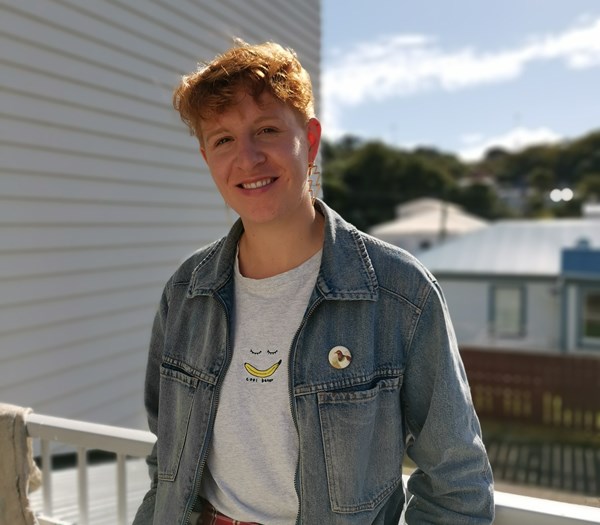
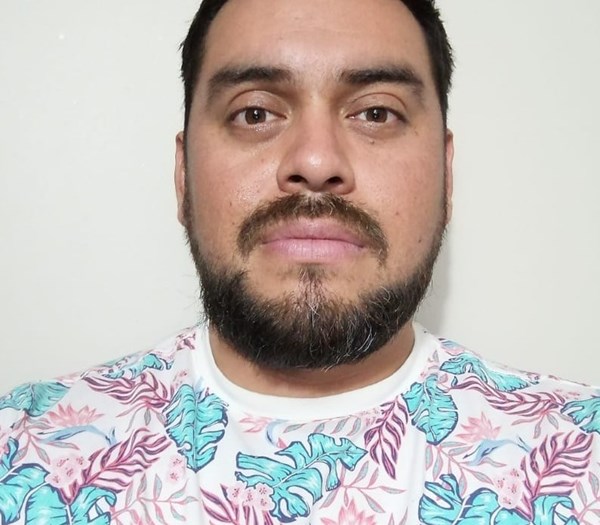
Daniel Antilef
The animal that Daniel feels most drawn to is the mountain lion. This seems apt. Mountain lions are highly connected to their land, wary of humans, powerful, and a symbol of leadership. Living in Santiago now, Daniel’s roots and vision remain with his family’s land in X Region de Los Lagos, in the South of Chile. Quietly spoken, he exudes a strong sense of identity, coupled with the proven ability to lead others and inspire collective action.
Although his Mapuche grandfather passed away before Daniel was born, he has been inspired by the stories his father has passed on about his grandfather’s regard for the land and indigenous practices. For thousands of years the Mapuche lived on the land without causing damage. They fought against Spanish colonisation because they saw it as their duty to protect that land with their lives.
This is a time when our country needs leaders and people with a broad vision about the future, and about climate change.
Unlike his grandfather, Daniel was fortunate enough to grow up in a time when being indigenous was something to be proud of. Daniel wants to reinvigorate the land that his forebears guarded with their lives. He plans to plant trees, use permaculture methods, and apply ancestral wisdom to live with, and from, the land. Already he has engaged with community from that area to collectively tackle practices such as the planting of monocultures by large forestry companies, which is depleting the water in nearby wells, streams and rivers.
Daniel hopes to be able to combine his electrical engineering career with his dream in the future. He currently works on energy projects, enjoying the ones that focus on renewable energy but aware of the contradictions inherent in other projects. It was these contradictions that brought Daniel to Dunedin in 2019 to complete a Diploma in Sustainable Practice from the Otago Polytechnic, which he describes as a ‘transformative experience.’ Working on a project focused on the future of his family land, he was able to meet many mentors in regeneration, including botanist Hugh Wilson, who has planted thousands of natives to reforest the land at Hinewai Reserve, near Akaroa.
For now, Daniel is balancing the need to focus on his growing family. During Winds of Change, he and his wife Avigail welcomed their second child, Rayén, a sister for Daniel Jr. Aside from spending time with his family, Daniel enjoys cycling the hills near Santiago. In 2020 he bought a piano — having always wanted to learn to play the piano but not having the opportunity — and set himself a goal to learn. He has progressed to being able to play some Chopin, a composer whose work he admires.
Winds of Change has been a natural extension for Daniel. His interest in climate change was at first triggered by El Niño and La Niña but as climate change impacts began to affect his family and nearby acquaintances, that interest grew.
His goal remains to restore and work with his family’s land sustainably. He will also continue and expand his work to help communities improve their situations, not just in relation to climate change, but also poverty and social injustice.
Richard Navarro
Richard was born in the little fishing town of Boyeruca, which lies between Region del Maule and Region del Libertador Bernardo O’Higgins on the coast in the middle of Chile. He completed his primary and secondary schooling in public school, saying that it was to a ‘very bad level… the public education in Chile is not really good,’ before commencing work as a fisherman, with his father.
He worked with his father for about four years and during that time became a syndicate leader. He had no intention of studying then but was engaged with developing ideas and projects to improve the town’s livelihood. He was instrumental in getting governmental funding for the syndicate to install oyster farms, providing the opportunity for extra income for the town and changing the traditional focus on catching fish and harvesting certain shellfish.
His interest in sustainability can be traced back to being a fisherman, noticing changes and scarcity in fish populations. This prompted his decision to study aquaculture, although his initial interest was in production, not sustainability. The sustainability focus came in a waking dreamlike state, in which he experienced a total shift in perception. This experience prompted him to adopt a vegetarian diet and make the decision to learn about, and to promote, environmental sustainability.
In 2011, Richard received a Chilean Government scholarship to complete a Vocational Graduate Diploma of Aquaculture Hatchery Management in Perth, Australia, although that was difficult at first as there had been no opportunity for him to learn English during his public schooling in Chile. As well as studying live diets in the feeding of fish larvae, this course introduced Richard to aquaponics, understanding the functioning of a system of mutualism as a small-scale ecosystem. He says that this new area of study was influential, ‘its impact having a good effect on my perception of the world.’ Richard had left his girlfriend behind in Chile when he went to Australia, but upon his return, they married and soon afterwards had a son, Dante. Both Richard and his wife had a dream to come to New Zealand.
Richard started a Master of Environmental Science in Chile but found it difficult to order his ideas in a forum where he felt that both his classmates and teachers had a very different vision in relation to the environment. To help clarify his thinking and get ideas for his thesis topic, he put his master’s on hold and came to New Zealand with his wife and son, to do a Diploma in Sustainability at Otago Polytechnic, in order to ‘find more proof of the problem and solutions.’
It was through his lecturer at Otago Polytechnic that he found out about Winds of Change, which he says, ‘has a strong vision,’ although working in a geographically dispersed group had its challenges. In New Zealand, Richard has found a much better fit for his vision of sustainability, which ‘starts with myself,’ he says. He wants to connect sustainability with philosophy, although he sees that as a personal journey. In the meantime, his diploma is looking at systems of food production.
The future is unclear at this stage. Civil unrest and violence, and the deeply entrenched inequalities of the capitalist system in Chile make him wary. He will return to finish his master’s but neither he nor his wife are certain that Chile is the place they want to be long-term.
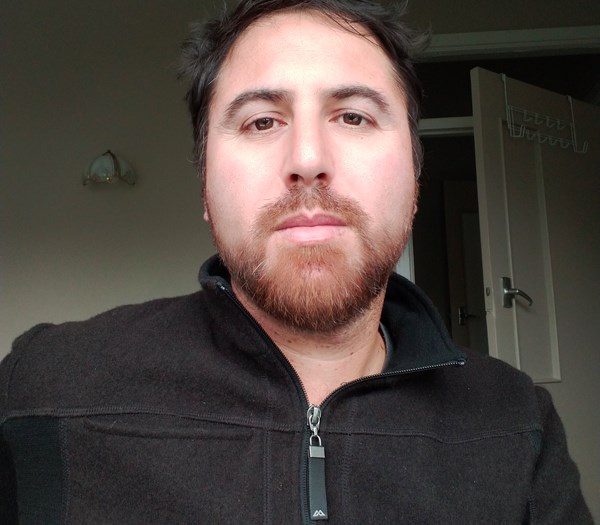
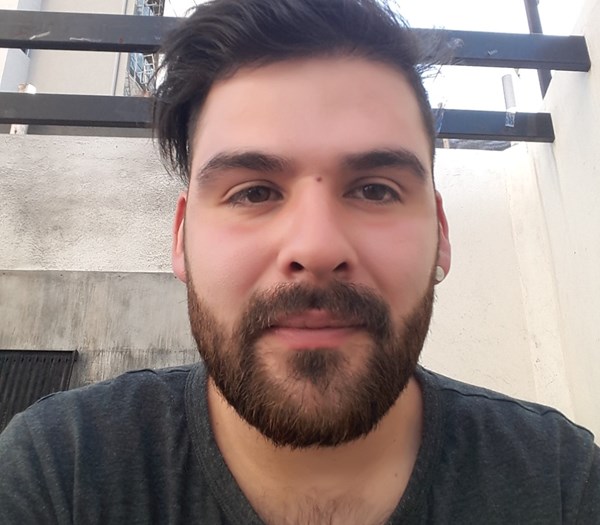
Kevin Basoa
Kevin was born in Santiago and has remained in that city, except for a couple of years spent living at his girlfriend Viviana’s family farm, about 40 km outside of the city. He completed his undergraduate studies in mechanical engineering at the Universidad Tecnológica Metropolitana in 2017 and is expecting to complete his Master of Meteorology and Climatology from the Universidad de Chile in 2021.
Kevin’s entry into the field of climate change impacts is an interesting one. I can hear hesitation as he tells me that, initially, ‘it was for convenience.’ He was looking for a research topic relating to his undergraduate degree. Climate change was considered important, and it was easier to find employment with knowledge or experience in that field. From that pragmatic entry point, it was not long before Kevin was drawn hook-line-and-sinker into making the world, and people’s futures, better.
I discovered that if you work in climate change you can make an impact and help people to live better, to make changes so that things can be better than they are. I keep going from that perspective. That is the main target.
Kevin has since worked on several engineering projects based on sustainable development and the environment. While completing his master’s degree, he also works as an external consultant for the Ministry of Environment of Chile. As a researcher in the evaluation of Chile’s Nationally Determined Contribution (NDC), Kevin’s work focuses on black carbon, and includes inventorying black carbon, and researching mitigation scenarios to achieve Chile’s reduction goals.
Kevin is a self-confessed city aficionado. ‘I like the city. I’m not an adventurous person who wants to do camping or trekking.’ The beach is also a special place. He would often visit his grandparents at their home by the beach, at Playas Blancas, close to Santiago.
There are plenty of animals surrounding Kevin. At his place in Santiago, he has five cats and seven chihuahuas. On the farm, there are chickens, rabbits, and even more dogs, as they run a breeding kennel.
Of Winds of Change, Kevin enthuses about the people, ‘they’re really lovely. My colleagues from my group are really good people — I love it!’ He has also learned some surprising things. With his group’s project focusing on the transformation of methane, he had no idea that almost half of the emissions in New Zealand come from the agricultural sector. In Chile, they come from fossil fuels but, he says, containing his laughter, ‘in New Zealand you have the “really bad” out of cows!’
Key influences in Kevin’s life have been his family, particularly his parents, and his girlfriend, whom he has known since high school. Although his girlfriend, Viviana Nuñez, was not a participant in Winds of Change, she has made a valuable and enduring contribution to the programme as the artist who designed the beautiful Winds of Change logo, with its interwoven Mapuche and Māori symbolism.
Kevin’s plans to travel in 2020 were put on hold because of COVID-19. For the near future, he would like to continue his work with the Ministry. Beyond that, he would like to complete a PhD outside of Chile, somewhere that aligns with the work that he has been doing, and that gives him an opportunity to learn more in his field and continue with language acquisition.
Lauren Turner
Born in Singapore, Lauren’s family arrived in New Zealand when she was two years old. Due to her father’s work, the family moved frequently, spending time in different places. Most of Lauren’s schooling was completed in Wellington and her undergraduate degree at the University of Otago.
Lauren’s connection with the environment was one that developed through lived experience. Her family engaged in a range of outdoor activities, tramping, camping, and being close to nature. It was this proximity to nature that made Lauren contemplate ‘how precious the environment is and how lucky we are.’
Lauren completed a Bachelor of Physical Education at Otago. She enjoyed her study but reflects that high schools tend to promote certain options and pathways for tertiary study, and that she didn’t know the variety of things that could be studied at tertiary level as a young school-leaver.
During her undergraduate years, Lauren was involved in many groups in a leadership capacity. These roles enhanced her skills and provided the ‘opportunity to connect with a variety of people and to learn from the collective pool of knowledge.’
A lecturer of a paper on Environment and Society was a key influence for Lauren in her early studies. She describes the content of the paper as ‘on the cusp of sociology, physical education, and environmental sciences.’ It spoke to her already strong interest in community and nature. The passion that the lecturer brought to teaching, his appreciation of different learning styles, and the ways in which he brought content to life, were inspirational for her.
This lived experience approach is something that Lauren loves in her current Master of Sustainable Development Goals through Massey University. A new course, Lauren is in the first cohort, and appreciates how the course draws from many different disciplines — urban planning, agriculture, food science, international development — giving her the opportunity to explore at disciplinary level and then to step back and consider how these fit together.
We’ve got a lot of problematic power hierarchies to deal with, so any way I can contribute to unravelling these will be good.
The ability to delve into different fields is something Lauren has appreciated in Winds of Change. She has valued engaging with different areas of knowledge and technologies and has learned a lot from others. She is very attuned to the cultural 10 challenges of working across different locations and languages, reflecting that even if ‘you think you know how to deal with it,’ there are nuances in language and in working with people you haven’t met. Her interest in Latin America has developed ‘so much more’ and she appreciates how special language is, which has resulted in her continued use of Duolingo to learn Spanish.
Lauren hopes to go to Rarotonga to work on a Volunteer Services Abroad project in 2021, to continue developing cross-cultural skills. She is excited about the prospect of ‘learning about things related to development theory in real life,’ and gaining practical experience.
Longer term, it will be one or more of the ‘many challenges that humanity faces’ that Lauren will engage with, whether that is to do with the environment or other societal issues.
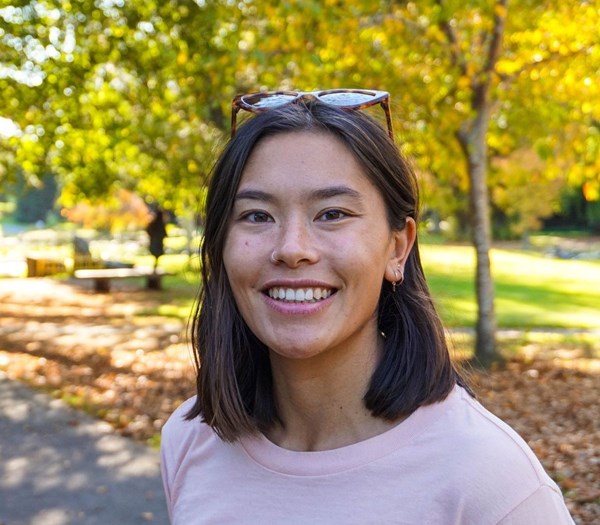
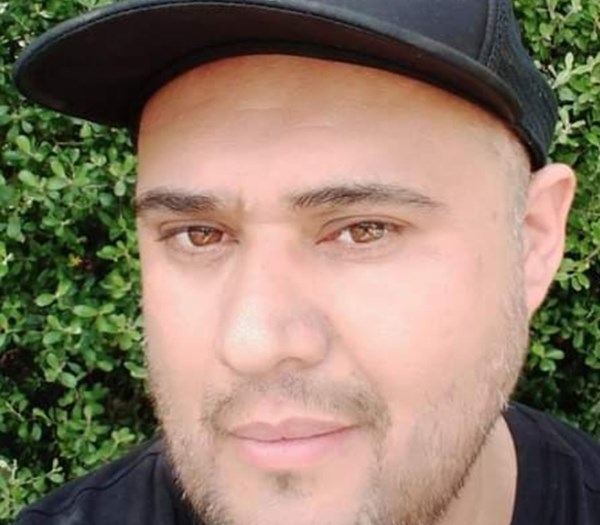
Mauricio Saravia
Mauricio was born in the small town of Melipilla, near Santiago. Growing up there was a very different experience than being in a larger city. ‘You are so close, because all of the people in a little town know each other,’ Mauricio says. This, and what he describes as a ‘poor public education’ made the transition to university study challenging.
His first forays into tertiary education were in a different field. He studied journalism at the Universidad de Valparaíso for a year, and then Literature and English at the Universidad de Chile for two years. However, family and economic problems cut both short, with Mauricio having to assume family responsibilities at a young age to care for his mother and siblings.
When Duoc UC Institute, in collaboration with Pontificia Universidad Católica de Chile, established a new training centre nearby, Mauricio took the opportunity to enrol in Construction Engineering, and is currently in his last semester. It has been a good fit, aligning with his creative skills, including his love of drawing.
Mauricio’s work within the construction sector in Chile fuelled his interest in sustainability and equality. He could see that ‘construction contributes a lot to pollution and inequalities of society,’ which prompted him to start thinking about what he could do to help change things. This was where his journey with the environment and sustainability commenced.
His early life made Mauricio determined to contribute to a better future. Despite hardship, his mother always encouraged him to do the best in everything, setting an example for him. He didn’t have anyone to ‘show him the way but had a strong sense of motivation to change things… to change the poor situation and get a better future for all of us.’
That dedication brought Mauricio to Dunedin in 2020. There, he successfully completed a Level 4 academic English course which allowed him to enter and complete a Diploma in Sustainable Practice at Otago Polytechnic, and from there, to Winds of Change.
Winds of Change has given him a ‘big picture of the current situation, through real experiences on land and in the ocean,’ and inspired him to think more about how he can help address climate change impacts. It’s a journey he would like to continue in New Zealand, rather than Chile. In Chile, he feels that although there is a group of 11 people who are concerned, ‘the people who have the power, or could do something, don’t.’ That goes back to his experience in construction in Chile, where ‘industry and capitalism are strong,’ and policy tends to protect that economy.
A lover of nature — beach, forest, anywhere in nature — Mauricio bought a van to convert into a self-contained camper so that he could travel New Zealand. Although he had to postpone the journey’s start, it is something he is still looking forward to doing.
In the future, Mauricio would like to bring his wife and his 13-year-old daughter to New Zealand, where he feels there is more opportunity for education, and for him to realise his vision, building on his current project to create affordable community housing with natural materials and green energy.
I want to develop my ideas on environmental sustainability… building with natural materials to create some kind of project to help people and to figure out how I can unite all of those concepts: sustainability in construction, social health, and environmental issues.
Jenny Stein
Jenny has been interested in the environment for as long as she can remember. She was born in Gisborne, an area rich in Māori culture. When she was eight, the family moved to Reefton, a small town on the West Coast of the South Island, before moving to Dunedin when Jenny was 13.
The child of older parents, Jenny’s family didn’t tend to do outdoor pursuits together, but they were environmentally aware, and Jenny was brought up to ‘wonder, and to respect the environment in its diversity, not to think that humanity is better than anything else,’ she says.
It was at university that Jenny developed her love of hiking and the outdoors. Although she started her undergraduate studies in zoology, she ‘clicked’ with geology more and loved the field trips — seeing more wildlife within natural environments on these field trips than she had been exposed to through zoology. Of the Winds of Change field trip, she says, ‘it was one of the best I’ve ever been on.’
Another highlight of Winds of Change for Jenny was being inspired by ‘so many people who are motivated towards the same direction but coming from different places.’ She knew nothing about Chile before the programme and would love to go to Chile now, to meet her Chilean-based group member and to consolidate what she has learned from the Chilean participants by seeing and experiencing their culture and environment for herself.
After graduating, Jenny spent some years as an exploration geologist in Australia and as a geologist in New Zealand before coming to the realisation that she wanted a change in career. She took a break to walk Te Araroa, the 3000 km route from Cape Reinga to Bluff, before going to Japan to teach English.
During this time, she became disheartened by the political undermining of the global response to climate change and associated scientific research and started to question what she could do to help the situation. She came back to science, but from a different angle. She considered how some people don’t understand or don’t trust science. She realised that being involved in the communication of science to wider audiences, so that they could be more empowered and informed, was something she was interested in doing. This saw Jenny return to Otago to complete a Diploma in Science Communication in 2020.
Most parents probably give their kids a nightlight when they’re very young. Mine gave me a TV, a VCR, and David Attenborough documentaries. That was my nightlight! I went to sleep listening to the ‘Trials of Life.’ When I was young, I could pretty much quote the entire series.
In the future, she wants to find a job where she ‘will be of most use, happy, and effective,’ in helping establish sustainable societies that exist in harmony with their environment, whilst also adapting to ongoing climate and environmental change. While changing career in her mid-thirties is a ‘slightly scary’ experience, she says, ‘if you want to turn your life upside down, do a different job, or whatever, just do it… don’t get locked into something if it’s not what you want to do or contribute to. Go find something else!’
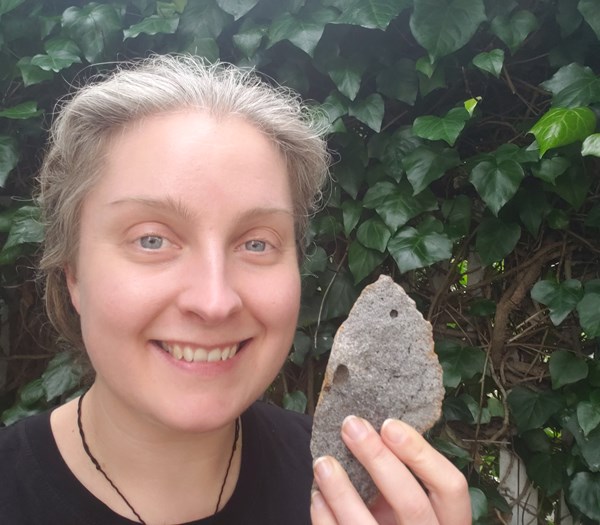
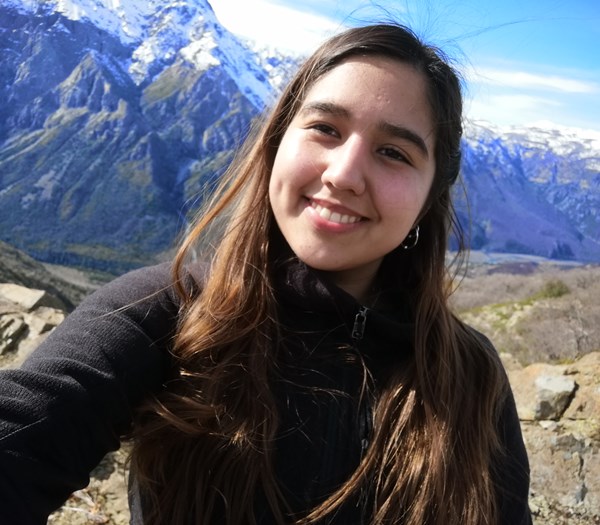
Valeria Gonzalez
Valeria was born in the small city of Rancagua, about an hour south of Santiago. She moved to Santiago to study five years ago and, since then, her family have also moved to Santiago. She is the middle child, with two older and two younger sisters, but she is the only one of the family who is researching and working directly on mitigating climate change impacts.
It was water that shaped the course of Valeria’s choice of further education and career. While still at school, she started to think about access to water. In her own home, she could take a shower, she had drinking water available, yet for some people those things were not possible. Some people had to walk many kilometres just to obtain drinking water.
When the opportunity to study to become a natural renewable resources engineer arose, she chose that career. She is moved by what she does, and the problems that she feels keenly — water, soil, and biodiversity — confirm that what she has chosen to do is important.
The importance of this work has also been taken up by her mother and sisters, whom she lives with. They have a vegetarian diet, they recycle, reduce water use, and try to be very conscious about the way that they live and its impact on the environment.
I’m very proud of my family because we can talk about these things and that’s important because if we are able to talk about these things, we can start to pressure the policy makers.
Of Winds of Change, she has found the programme to be a great experience, especially the opportunity to meet people from different backgrounds and to get ‘to know new realities.’
Although she is only 22 years old, Valeria is about to complete a Master of Territorial Management of Natural Resources at the Universidad de Chile. When asked about her plans for the future, she laughs and says, ‘it’s very complicated, I ask myself that every day!’ Starting university at 17 and progressing so quickly through her undergraduate and then a master’s degree meant that she didn’t really have time to think about what was next. Although her thesis is very scientific, Valeria is also a sociable person who enjoys working with people.
Her work as a monitor in the university owned Quebrada de La Plata nature sanctuary has provided the opportunity for this engagement with people. Her role there as a guide and educator made her realise the importance of education in a context where people can physically connect with the environment, see the tangible 14 evidence of what is happening, and understand how to protect it. Longer term, she’s not sure whether she wants to work with computer models or people, or if a job exists that would enable her to use both of those skills.
To regenerate, Valeria likes nothing more than spending time in the mountains, getting away from the pollution and the population of Santiago to a place where she can ‘connect with everything that motivates me.’ Like many of her fellow Chileans, she is lavish in her praise of Pastel de Choclo, a seasonal dish with corn that she looks forward to all year. An animal lover, she has always had pets; dogs, turtles and more recently a very special cat called Reika. Unfortunately, Reika passed away suddenly, but not before bringing some magic into the lives of Valeria and her partner, showing up just when they were most in need of solace, and bringing great love and joy with her.
Valeria and her partner met at university and he is also passionate about the environment. ‘It’s been a very beautiful process to find someone who can accompany you in this life,’ she says.
William Henriquez
William, who shares the name William Henriquez with his father, was born in San Bernardo, a small city south of Santiago. He lived all his life there, with his parents, and one sister. He attended public and semi-public schools in San Bernardo before going to study at the Universidad de Chile in Santiago.
Growing up from early childhood, William had always been fascinated by the natural environment. He loved going to the countryside, or to the beach, with his parents, where he would immerse himself in observing plants, insects, and rocks. His parents remember that he was always more interested in being by himself looking at nature than in playing with other children.
From a young age, he kept a garden with plants and vegetables. When he was about 13 or 14 years old, someone gave him a book on biology and he says, ‘I started reading about biology and, I love it. I love it! So, I decided to study biology.’ First in family to go to college, that book — which he still has — was the single biggest influence in William’s academic direction.
Arriving at paleoclimatology was almost accidental. In his first year at university, William tried to secure a position in a lab studying cancer but there was no space available. Through a paper on the biology of plants, he was offered a space by a professor to work with plants, and William found out that he was using plants to study climate. He enjoyed this perspective and it launched him on his paleoclimatology career path. Having completed an undergraduate degree and a Master of Biology, William is now finishing a PhD in Geology at Victoria University of Wellington.
An animal lover, William’s family have always had dogs, including a very special poodle, Toby, who lived with the family for 16 years. Since he has been away, the family have gained another eight large dogs, having taken in a stray without realising she was pregnant. Although William had little spare time when writing his thesis, he is beginning to find time again to swim and dance, two of his favourite activities.
Winds of Change has given William a different perspective on climate change. He enjoyed the opportunity to interview people and contribute to making a film for the group assignment, both things he had no prior experience with. More importantly, as a paleoclimatologist, he hadn’t focused on solutions before, so the realisation that it is ‘not just about what is going to happen but what we can do to prevent it,’ was a significant shift for him.
William’s dream has always been to work in one of the top universities in Chile. When he finishes his PhD in New Zealand, he has a postdoctoral position in the Universidad de Chile. Due to COVID-19, he is likely to commence this online before returning to Chile, but he is one step closer to his dream of researching and teaching in this university.
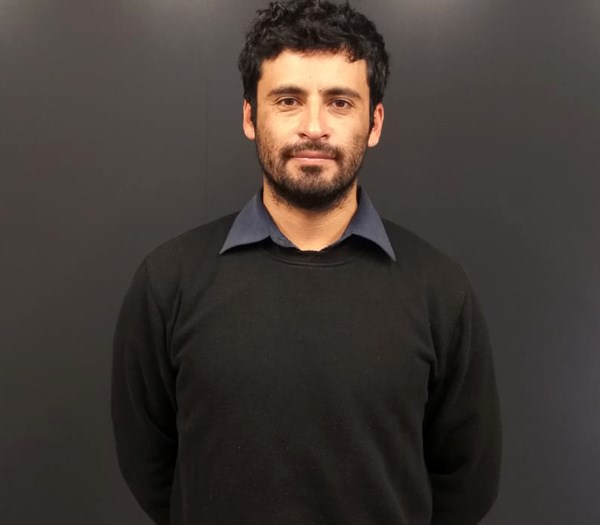
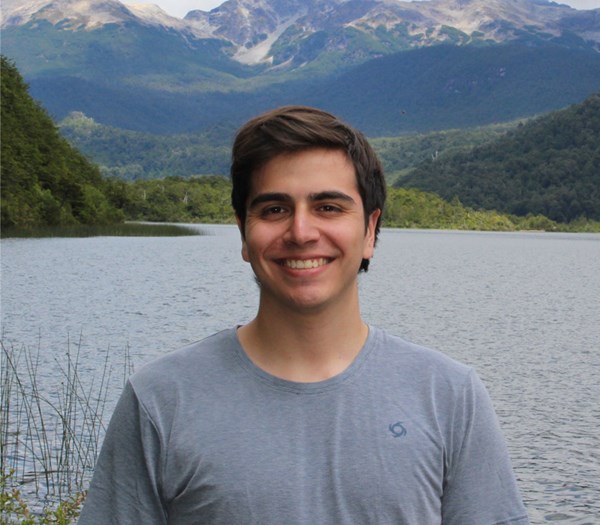
Benjamín Inostroza
Born and raised in Santiago, Benjamín is the youngest of four siblings. From a young age, he was concerned with social and environmental issues. At school, he was part of a foundation that worked with children from complex socioeconomic backgrounds. He took advantage of opportunities to take summer courses in environmental studies while still at school. Beyond academic interests, he was also in the pre-orchestra, the choir, and practised athletics and volleyball.
Like many of his Winds of Change colleagues, cycling and trekking are two of his favourite pastimes. They are also linked to his love of the environment. ‘When you have experiences since childhood that allow you to connect with nature, you feel obliged not only to respect it, but to contribute to its development and protection,’ he says.
Benjamín commenced Civil Construction at the Potificia Universidad Católica de Chile, which aroused his interest in the use of more environmentally friendly construction materials. After a year, he moved to the Universidad Adolfo Ibáñez, where he is currently studying a double degree in civil and industrial engineering.
During his fourth year of study, Benjamín and a group of friends developed a research project on the use of recycled aggregate for the production of concrete. They proposed using a bacterium from industrial waste to degrade the remainder of cement paste and other compounds to purify the aggregate.
Since the construction industry generates one of the highest rates of pollution in our country, it is important not only to learn about it, but to work on developing solutions that benefit the environment, reducing negative impacts from the industry without damaging production levels.
About Winds of Change, Benjamín was excited when he learned of the opportunity, although he did not believe he would be selected, since there were only 10 places available for Chile. He applied anyway and has valued the opportunity to attend different presentations on diverse topics related to climate change, which he says, ‘have been fascinating.’
He is very close to his family; his parents, grandparents, siblings, nieces and nephews, whom he adores. He values and admires the work his parents have done and the love they have shown over the years, both of which have contributed to where he is today.
Other influences include Professor Daniela Buksdorf at the Universidad Adolfo Ibáñez, with whom he had the privilege of analysing the impacts of otherness on South African society. He admires a number of teachers at the Faculty of Engineering and Sciences who have encouraged his broad vision of the world, including Rely Pellicer, Federico Antico and others. He also values and admires the group of friends that he has at university. ‘I have been able to grow a lot as a person, thanks to them and the different visions we share every day,’ he says.
Benjamín would like to continue his training and gain professional experience in the future. He loves to travel and learn about different cultures, so would welcome an opportunity to study abroad.
Danilo Perez
Speaking with Danilo, the words global citizen come to mind. Born in Austria, Danilo’s grandparents were from Italy and Spain but moved to Chile as refugees after World War II. Danilo’s parents returned to Europe as refugees during the military dictatorship in Chile, coming back to Chile when Danilo was four years old and settling in Santiago. Danilo is currently based in New Zealand, studying at Auckland University of Technology but his siblings are scattered around the world, with brothers in Chile, Canada, and Sweden, and a sister in Austria.
Danilo likes to introduce himself as a cyclist because it tells a lot about his mindset, ‘I’m not afraid of long-term challenges,’ he says. As he reveals more about himself, this becomes evident. Danilo studied biotechnology engineering before going on to complete a Master of Chemical Engineering. He wanted to make a difference in mining, to make it less damaging, but looking back on his time with mining he describes it as ‘hitting a wall for ten years.’ He talks about the frustration of trying to get support for the use of bacteria rather than sulphuric acid in mining, where management is replaced every few years and therefore has a short-term, high-profit focus, favouring the more damaging use of acid as a faster alternative to biochemical methods.
Danilo’s not sure when he became interested in sustainability but before he could even read, he wanted to be an ecologist because of a book about an ecologist that he would get his mother to read to him, over and over. He even asked his mother to make oatmeal for breakfast because that is what the ecologist in the book ate for breakfast!
A bioprocess engineer, Danilo works from a process perspective, using bacteria and electricity. In addition to his studies, he and his business partner are working on long-term renewable energy storage solutions on commercial and domestic scales. Strongly principled, Danilo defends their decision to keep the domestic device affordable, to make profit from companies, not people.
Danilo describes Winds of Change as a challenging experience, ‘working with people you don’t know, with different approaches, from far away,’ but recognises that we will potentially need to become more proficient in these new ways of working in the future.
If there was a soundtrack of my life, it would be by the band Congreso, a band that is over 50 years old, from before I was born… They sing to meaningful things in life, we share a political vision, and that perspective of love, but not romantic love. They have stayed together and still make music even though they could have retired long ago.
In the immediate future, Danilo will continue to develop the business. Beyond that, he plans to move elsewhere, to Austria or Quebec, or perhaps to the Netherlands or Belgium, which have great cycling appeal. Wherever he ends up, one gets the sense that he will move steadily and purposefully toward his vision of enhancing the quality of life for people and planet.
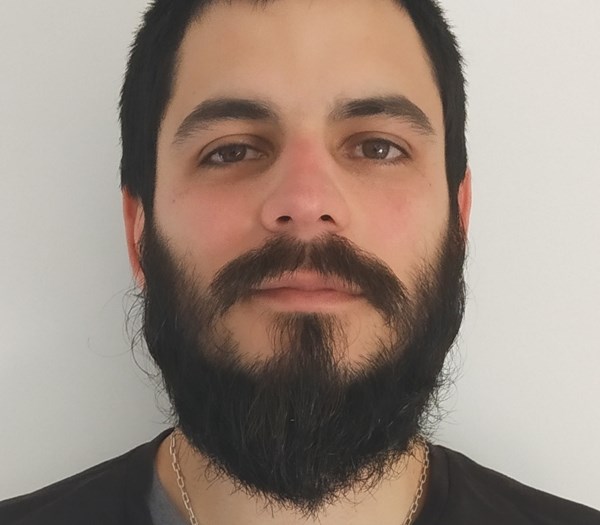
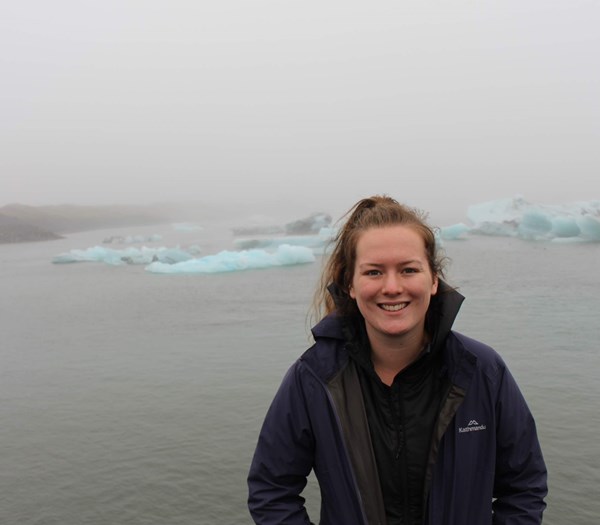
Julia Harvey
Julia was born and grew up in Invercargill, Southland. Science has always been part of her life. She describes her childhood self as ‘that nerdy kid who loved space and dinosaurs,’ and aspired to be either a palaeontologist or an astronomer. The ceiling of her bedroom in the family home has remained in its childhood state, ‘painted navy blue with hand-made collage planets and glow-in-the-dark stars in the configuration of the solar system,’ she says laughingly. Originally planning to complete undergraduate studies in neuroscience, Julia instead completed a BSc in Geography and Psychology in 2020. Although she didn’t take geography or environmental studies at high school, it was a first-year interest paper on human geography that altered the course of her studies. She describes ‘the issues of people and places as something I hadn’t properly thought about before. Learning about the way the environment impacts on different people and different places really struck home with me.’ Physical geography and climatology became a focus and the opportunity to do some ‘really interesting climate-related study,’ during a semester in Norway in 2019, fuelled her interest further.
Often, if you think as an individual about environmental issues you don’t feel as though you can achieve much, but when you see all these people together with the same objective, you feel really powerful to make change.
The human geography paper piqued her interest in environmental inequalities, and the link between what was happening in the physical world and how it was affecting people. For someone who has always had a ‘passion for people,’ this was a natural extension, since the environment affects all people.
Julia has always been engaged with community and social issues, having been a member of Invercargill’s City Youth Council in 2013. She was also an advisor for the Rotary National Youth Science Technology Forum for two years running, and a senior advisor the following year. These opportunities have been major influences, giving her ‘a sense of autonomy and of what an individual can do if they are motivated, ambitious, and driven,’ as well as what happens when you combine individuals with different skills and backgrounds who share motivation. This was something that she felt was evident in Winds of Change also.
As one of the younger participants in Winds of Change, Julia found it inspiring to work with people who were five to ten years ahead of her in their fields, and who loved what they did, from volcanoes to salmon, and everything in between. Rather than narrow her focus for the future, Winds of Change has broadened the scope of opportunities and directions she could pursue. In the short term, Julia will commence a Master of Environmental Management in 2021.
Longer term, she would like to work in the emergency management or disaster management field. Working with communities to understand their perspectives and experiences of environmental issues, climate resilience and climate-induced hazards, and with policy and mitigation strategies, is where Julia’s geography and psychology background make perfect sense.
Daniel Cárcamo
Daniel is currently completing a Master of Science in Marine Biology at Victoria University of Wellington.
Arriving just two weeks before New Zealand went into lockdown in 2020 was a difficult experience for Daniel, who missed his family very much, especially since there was little time to get settled or meet people before lockdown. Now, he has a great network of friends, including the new friends and colleagues he has met through Winds of Change.
Born in Viña del Mar and raised in Valparaiso, Daniel’s interest in ecology and environmental issues developed in high school. A biology teacher with a wide-ranging knowledge of biology and general science motivated Daniel’s interest in biology and, importantly, in creative solutions in relation to biology. This solution focused perspective has remained with Daniel, who has a keen interest in developing strategies for sustainable fisheries. Like New Zealand, Chile has a long coast, and the economy is sustained by natural resources.
When I think about solutions, I think about making fisheries sustainable, being able to use these natural resources for human consumption but also trying to maintain the stocks over time and for the future.
Although spare time is in short supply, Daniel likes to train at the gym, swim, and kickbox, as well as read and go to the cinema. Well-travelled, Daniel’s work as a biologist has taken him to Barcelona, London, San Francisco, and Dunedin. He has also visited Argentina, Uruguay, Brazil, and Cuba. He would love to go back to Barcelona again, to walk the streets and take in the beautiful architecture.
Marine biology was an accidental, but significant, direction change for Daniel. During his undergraduate study, an ecology professor asked if he would be interested in working in different ecological topics. ‘One of her projects at that time was a population census of sea lions and seals on the coast of Chile,’ he recalls, ‘so I began to dip into marine biology, and I fell in love with it.’
An enduring connection with marine mammals was formed and future studies may explore issues and interactions between marine mammals and fisheries, with a focus on policy and management. His favourite marine mammal? The Blue Whale, one of which Daniel saw in northern Chile. The biggest animal living on earth, he describes seeing one, ‘It was a shock. Amazing!’
His long-term plans including completing a PhD but, in the short term, he hopes to gain some professional experience in New Zealand before embarking on doctoral studies.
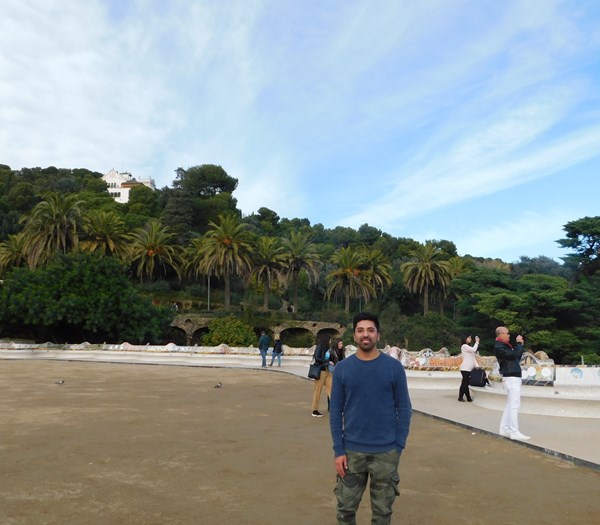
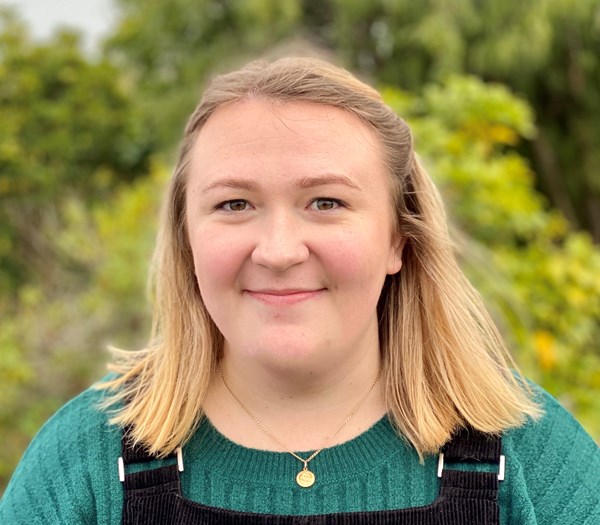
Nathalie Edwards
Nathalie was born in Wellington to parents who emigrated to New Zealand from the United Kingdom. When she was five, the family moved to a rural property, so she grew up surrounded by horses, sheep, goats, chickens, and other animals. She describes growing up in that environment as, ‘a nice life, calm and quiet, with lots of kids to play with, and plenty to do.’
It also instilled an interest in the environment and the natural world. Her own local knowledge of the Kapiti Coast had given her an inkling that things were changing rapidly. In high school, that fledgling interest was reinforced by learning about the science of climate change and what was happening in the environment.
Currently finishing a Master of International Relations, Nathalie has found Winds of Change to be both a challenge and an affirmation. The science for her group project on desalination was, she says, ‘intense, a steep learning curve.’ However, seeing how international policy and science meet has been fascinating, ‘like the Paris Agreement and countries using different sustainable development goals in their use of desalination. I am looking at my degree from an angle I haven’t before,’ she says.
As someone who loves learning and hasn’t studied science since high school, Nathalie loved the opportunity to learn the science of how and why things happened on Winds of Change and valued the ‘wonderful people’ and new friendships.
A regional volunteer for UN Youth New Zealand, Nathalie has also been an international delegate, which gave her the opportunity to gain first-hand knowledge of trade, economics and globalisation in Southeast Asia, and the need for collaborative approaches to issues, including those related to climate change.
Nathalie’s decision to study international relations was the result of a conversation in a Starbucks in Toronto, during her gap year. After hearing her order coffee, a man behind her recognised her kiwi accent and introduced himself as a fellow kiwi, and a diplomat. During that conversation, he told Nathalie about his diplomatic role, about international relations and politics. Following that chance meeting and ‘many google searches,’ she made the decision to study international relations.
For the future, she is certain that she wants to do something globally based but is open to what that is. She had intended to go into policy work — writing or reviewing policy — but her experience with Winds of Change and a summer school paper on strategic and foreign policy have led to her consider working on the practical side instead, perhaps working with communities to implement policy.
There’s a lot that New Zealand can learn from Southeast Asia, especially the way countries work together collectively to target issues.
Pamela Jordan
Pamela was born in Copiapó, which is within the Atacama Desert, the driest place in the world. Once a year, if there’s enough winter rain, spring transforms the desert into a beautiful vista of colour, a sea of wildflowers.
The main industry in Copiapó is mining — copper, lithium, salt and, in the past, gold. Pamela studied a technical qualification in mining in Copiapó before moving to Valparaíso to study chemistry, ‘because I love to make things in the laboratory!’ she says.
Pamela’s interest in the environment and climate change was sparked several years ago, following her work for a large Canadian laboratory, ALS. She was working as a client services and quality control representative for the company and became involved in highlighting the sustainability work the laboratory was doing. Recognising that for Chile, this work with the environment was relatively new, Pamela started questioning the social dimension of experience through her years working for the mining industry. ‘Most people think that if you are recycling you are looking after the environment, but how can you ask someone to recycle if that person has their own, significant, problems?’
She has witnessed first-hand the dual social and environmental impacts of mining. ‘You have to be aware and conscious of the people,’ she says. ‘We think most things can be solved with money but that is not the solution.’ Although mining is a huge source of employment, it takes people away from their families on a regular basis, forcing them to miss out on being together for important events, and contributing to family fragmentation, with a very high divorce rate. There are other corollaries as well, alcoholism, drugs, and violence.
The cost is too high. We are selling quality of life to earn money to provide a ‘good’ life for the family.
It was this conundrum that brought Pamela to the Otago Polytechnic to study a Diploma in Sustainable Development in 2019. A surfer, she loved living in St Kilda while she was in Dunedin, just a few minutes from the ocean. Her research project combined her passion for sustainability with improving the quality of life for miners and their families.
For some years, Pamela has been associated with the NGO Women in Mining, originally formed in the UK. However, the focus for this is engaging women professionally in mining, a traditionally male-dominated work environment. For Pamela, this is not enough. She comes back to a vision of improving quality of life for mining families but, as she says, ‘there are no projects in Chile relating to this but I’m sure I can relate my career to contribute to society in a sustainable way.’
Returning home to Chile in 2020, in the middle of the COVID-19 pandemic has been challenging, although having Pamela home for the first time in three years has been a huge relief for her family, especially her mother and sister. Pamela continues to do some research related to sustainability and climate change. She seriously loves sustainability — you can hear it in her voice — and would like to work on environmental or social initiatives, especially with communities and minorities.
Winds of Change has been a welcome engagement for Pamela, who has been able to flex both her love of science and her passion for humanity within the programme.
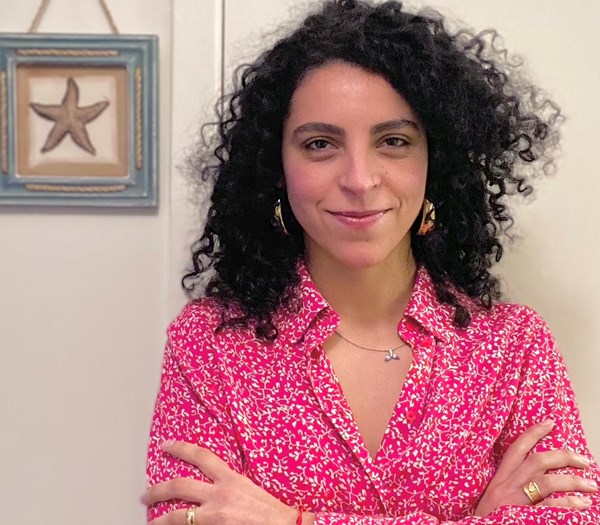
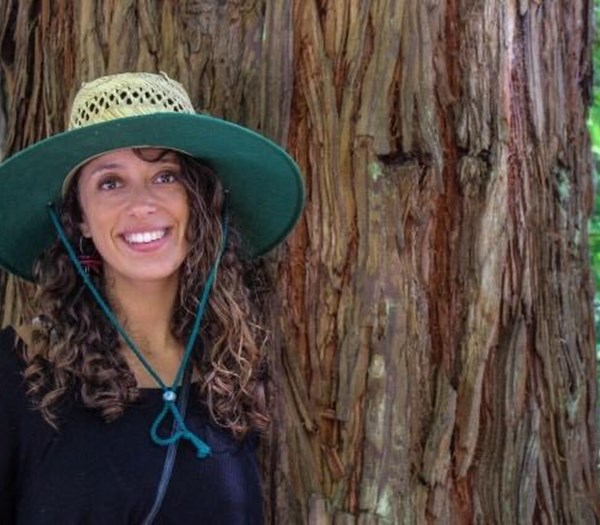
Fernanda Navarro
Fernanda grew up in Concepción in the South of Chile, the youngest of three children. Nature has always been a part of her life since childhood, through school, sporting and outdoor activities, and scouting. At school she was involved in a science research group, focusing on the environment. It was then that her interest in the environment was articulated, ‘I knew I liked it. It started a long time ago, and then at university I fell in love with it again for the second time,’ she says.
Fernanda qualified as a geological civil engineer and used her time at university to pursue her own research on sustainability. She focused on the area of environmental sustainability in her last year of study, with a particular interest in alternative energies.
She describes the experience of Winds of Change as, ‘really, really good for me, especially meeting the people, who are absolutely different.’ She hopes to continue contact with her group members and the Winds of Change network in the future, perhaps undertaking further research together.
Fernanda’s sister moved from Chile to New Zealand almost a decade ago, which led to Fernanda following. It’s a decision she hasn’t regretted. She loves New Zealand and is inspired by the similarities between both countries, the opportunities it has given her, and the potential there is to learn from each other. A keen rock-climber and hiker, New Zealand is a wonderful place for these pursuits. She finds the beaches of Coromandel and Papamoa beautiful, especially Papamoa, the area where she has been living recently.
Her family has been influential, but particularly her three nieces, one of whom is in New Zealand, and the other two in Chile. ‘They are really, really important and special for me, a kind of inspiration. If I do this, it’s partly because of them,’ she says, ‘I want them to be proud of me.’
The future is open for Fernanda, who would like to continue to develop her professional career or explore new learning experiences. She wants to continue improving her English, to get to a point where she could do research anywhere in the world and is considering the possibility of undertaking a PhD. Although travelling is not currently an option, she would like to travel more in the future, to work or research in areas related to geothermal energy or vulcanology. The important thing for Fernanda is that she is working on something that makes a positive contribution to the world.
Nature is essential to achieving all sustainable development goals understanding this two-way relationship, we can develop more effective solutions that promote peaceful, prosperous and more equitable societies.
There’s a shyness, a reticence, about Fernanda that may be due to the conversation being in English. Although when she speaks about her family, her nieces, or her favourite food, ‘Pastel de Choclo — delicious with a tomato salad,‘ her reticence vanishes, and she positively sparkles. Love is, after all, the greatest motivation possible.
Greg Hatley
Greg was born in Nelspruit, South Africa, to an English father and a South African mother. The family moved to New Zealand when Greg was nine years old, initially settling in the small South Island town of Gore, before moving up to the Christchurch region. New Zealand was seen as a more secure environment that would provide better opportunities for Greg and his two sisters.
Although he feels ‘more Kiwi than South African’ now, for some time after moving to New Zealand at age nine, Greg felt that he didn’t really belong and, as the years went by, no longer felt that South Africa was home either.
Greg’s connection with the environment goes back to childhood. Biology and living things had always interested him. Growing up on a farm, surrounded by animals and plants, stimulated his thinking about ‘living in the environment, how everything connects together.’
Attending Ashburton Borough School, the first school in the South Island to be recognised as a Green Gold Enviro school, was also influential. Having initially planned to study biology at university, Greg decided to check out the environmental programme offered by the University of Canterbury instead, moving towards physical environmental science. He completed honours in environmental science in 2020 and is currently planning to continue with a Master of Science.
Like most of the participants in Winds of Change, Greg commented that one of the highlights was ‘meeting a whole bunch of people from different backgrounds and knowing how all of the backgrounds come towards trying to achieve the same thing.’ He also appreciated working on his group project on geothermal energy, which was an opportunity to learn about something in a field that he has not had much engagement with before.
Not surprisingly, given his life-long interest in living things, the place Greg would most like to visit in the world is the Galápagos Islands. Within New Zealand, he enjoys the Beech forests of Fiordland. ‘Although I’ve done a bit of travelling around, it’s not something you get to see very often,’ he says.
For Greg, one of the key global issues is water. He hopes to have the opportunity to work in countries where he can make a meaningful contribution to improving access to clean water. He is open to what the future might hold, but certain that he wants his future work to have positive impacts.
Everyone in the world should be able to drink clean water, and we could potentially make that happen, but there are still around a billion people without clean water. It’s crazy... perhaps we don’t have the right people, or enough people, thinking about what to do.
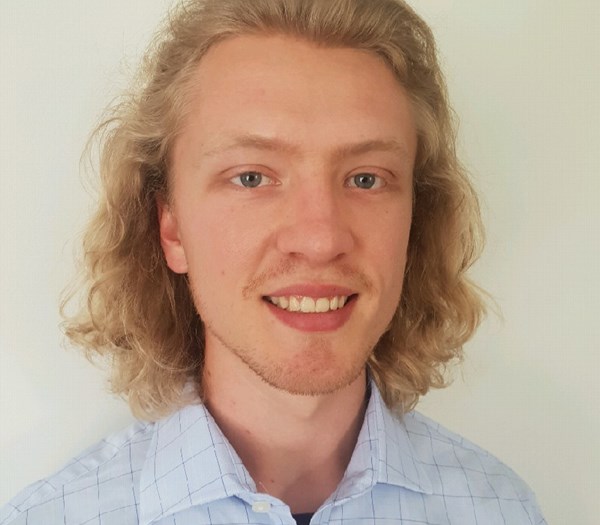
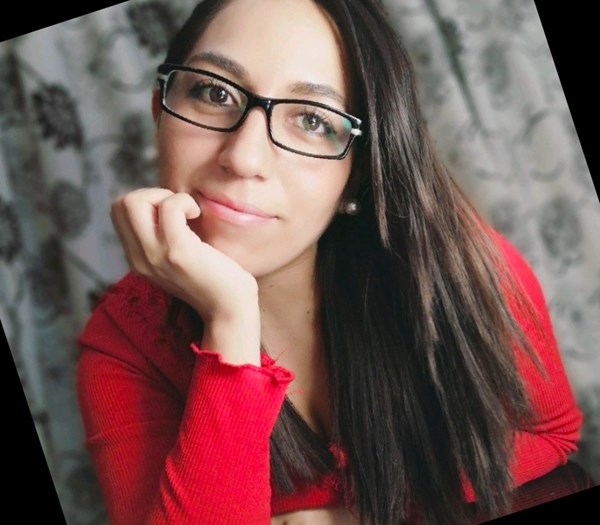
Paula Llanquileo Melgarejo
Paula was born in Santiago and has remained there to the present day. She has a degree in chemical engineering and is currently finishing a PhD in Engineering Sciences, Civil Engineering, in the Department of Hydraulic and Environmental Engineering at the Pontificia Universidad Católica de Chile.
She tells me that ‘we [herself and her son Elías] are very calm, and I love silence.’ There is, indeed, an aura of quiet competence about Paula. She has two main motivations, her profession and her nine-year-old son. When she is not working, she loves to spend time with her family in nature — mountains, waterfalls, or her favourite place to hike near Santiago, Cajón del Maipo, Aguas de Ramón.
Paula has a long-standing interest in the environment, particularly environmental impacts on indigenous people. She was fascinated to learn about environmental impacts on Māori in New Zealand through Winds of Change and to compare the two countries’ experiences. She also noted how diverse New Zealand is and hopes to continue to engage with the Winds of Change network, and possibly work on other collaborations with her new colleagues in the future.
I saw the impact in the south of Chile when travelling with my family; the impact of the actions of big companies, particularly to do with water. The impact is greater on indigenous people.
Paula’s plans to spend eight months in Spain and Italy in 2020 were cancelled because of COVID-19 but she still aims to move away from Chile in the future. She’s not sure where to but wants to continue her work and contribute in another part of the world.
Her current work focuses on municipal waste management, but she has worked in many other areas including water, atmospheric pollution, biomass, renewable energy, and mining.
A move away from Chile will allow her to extend her professional development and provide better education and life opportunities for Elías, who was born with Down Syndrome and has special needs.
Paula absolutely loves science and the application of science to find solutions to environmental impacts. It is, she says, her ‘daily motivation.’ Her list of accomplishments, in leadership, employment, and research, is impressive, but she doesn’t refer to these. A high achiever, but modest, her focus is on the work that she is doing, and will do in the future, and on her family. Paula is an accomplished academic, a hard-working scientist, and a parent with a deep love of family.
With her drive to improve conditions for all, she is truly inspirational.
Adele Lonergan
Adele was born and raised in Wellington. The outdoors has always been an important part of her life. As a teenager, she was taken on most of New Zealand’s Great Walks by her father, including the Heaphy, Kepler, Milford and Abel Tasman tracks. At seven years of age, she began playing competitive football, which she still plays now, and was proud to be Captain of the First XI Football team in her final year of high school.
Because she spent so much time in nature, Adele has always felt connected to the environment, although that connection was initially focused on leisure and enjoying the outdoors. It was travelling for a year before starting university studies that prompted her to look at the environment, and our relationship with it, from a different perspective. She describes walking along a bay in Cardiff, Wales, as she would in Wellington, except that in Cardiff the ‘whole waterfront and ocean had all this trash in it.’ In the UK, she was shocked that all vegetables and fruits in the supermarket were plastic-wrapped.
Observations and experiences during that year of travel inspired Adele to study tourism on her return, further developing her interest in sustainable development and protecting and preserving the environment. Living in alignment with these principles is important to Adele. An animal-lover, lambs are one of her favourite animals and this, as well as the impact on the environment of meat consumption, contributed to Adele’s decision to adopt a vegetarian diet. She continues to learn and challenge herself to make other lifestyle changes, such as reducing single-purpose purchases, volunteering for clean-ups, and generally reducing her environmental footprint.
The opportunity to participate in a sustainable development trip to Brazil in 2020 continued this trajectory of sustainability engagement. The trip, which included some time working with an Amazonian community in Tumbira, near Manaus, ‘was incredible, just amazing, like nothing I’d ever done before,’ she says.
Aside from ‘classic nature-loving people like David Attenborough,’ it has been life experiences, ‘a collection of lots of smaller things,’ that have led Adele to where she is now, having finished her Master of Tourism Management in 2020. She would love to work with the Department of Conservation, focusing on sustainability in the tourism sector. The United Nations would ‘be pretty cool too!’ she says.
Unlike most of the other Winds of Change participants, Adele hadn’t studied science since high school, but found the programme amazing and was inspired by the people she met, never imagining that she ‘could have so much in common with all these PhD science people.’ It also broadened her understanding of the opportunities to engage with sustainability in all sectors, which is of tangible value as she contemplates her post-master’s career.
I really care about people and futures, equality and equity… not just the environment, but that as well. I’d like to work in conservation, sustainability and social change.
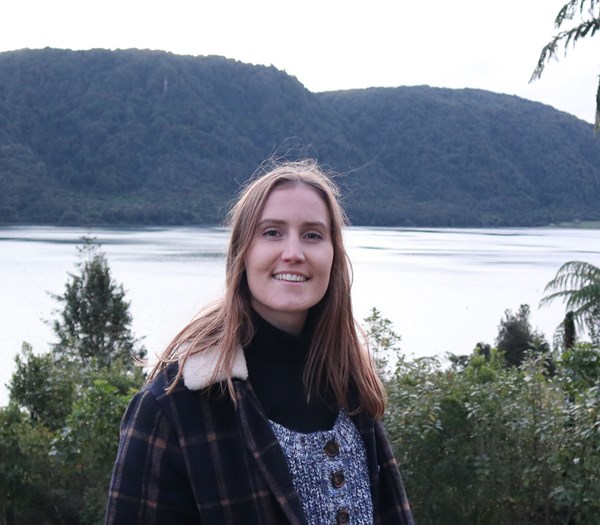
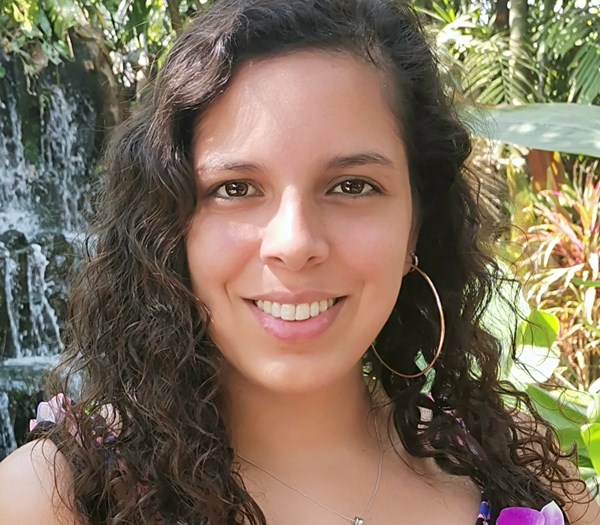
Daniela Miranda
Born and raised in Santiago, Daniela lives with her mother, her 14-year-old cat Gary — a Libran who is more like a brother to her and is named after the snail in Sponge Bob Square Pants — and two dogs.
For Daniela, her interest in climate change is inseparable from her love of animals. Over ten years ago, she began to consider the implications of humans eating meat, for animals and for the planet. She describes her first introduction to climate change as the realisation that ‘we are literally destroying the world because we want to feel pleasure in eating animals.’ This prompted her to adopt a vegetarian diet in 2011, which was rare at the time in Chile.
A sociologist, Daniela didn’t really expect to be selected for Winds of Change, although she feels that social scientists can make a valuable contribution to mitigating climate change impacts. She has enjoyed learning from experts in many different areas that she hasn’t had much engagement with previously and says with a laugh that her Winds of Change project team of three, and the wider group, ‘want to solve the problems of the world!’
It wasn’t until Daniela began working at the Food and Agriculture Organization (FAO) of the United Nations (UN) in 2019 that she identified possibilities for working as a sociologist in areas where she could make a difference.
As a centennial, Daniela’s path has been influenced by ‘growing up watching wars and disasters on television.’ Observing the work that the UN, Red Cross, and other humanitarian workers do in the field has inspired her commitment to contribute through humanitarian work.
I wish that someday every woman can be whatever they want and can enjoy their lives and their bodies the way they want. That’s the main goal I have in my life.
She sees leadership as vital and would like to be within a group of young leaders that influences decisions and makes a real impact. ‘It’s really frustrating when you realise that there are 10 people in this world who can decide everything,’ and that’s where being part of a group that can infiltrate or influence those positions is important. While street action is good and necessary, ‘you also need to get to those positions who make the decisions,’ she says.
When she is not working or studying, she enjoys going out with friends, playing beach volleyball or other sports, or just hanging out with Gary the cat, and she has a weakness for carbohydrates — fries, potatoes, spaghetti, lasagne!
In the future, Daniela would like to be part of a team that works on programmes and policies to improve lived experiences and reduce suffering, in such areas as climate change and conflict, or disaster preparation. Specifically, her goal is to help women to be exactly what they want to be, something she has felt strongly about since childhood.
Paula Yarur
Paula was born in Santiago, Chile, to a Belgian mother who was raised in Canada, and a father of Palestinian descent. The food at home was very different, an amalgam of Canadian and Belgian, and it wasn’t until Paula came to New Zealand that she learned to cook Chilean food, because she missed it.
She didn’t particularly enjoy growing up in Santiago, not being a fan of big cities, where the ‘human aspect and the connection with nature is lost.’ She decided to move away and study tourism, thinking that she would be in a state of permanent holiday for the rest of her life, but realising very quickly that she was ‘working while everyone else holidayed!’
She traces her connection with nature to her childhood and many trips away camping with the scouts. This influenced her decision to study ecotourism. During her ecotourism studies she engaged with many different disciplines, including anthropology, ecology, marine ecosystems, terrestrial ecosystems, and human geography. She also gained certification in mountaineering, diving and other activities. Following graduation, she worked as a mountain guide in Chile, specialising in mountain horseback riding.
Paula decided to have a working holiday in New Zealand because it, along with Costa Rica, was constantly referred to by her ecotourism lecturers as an exemplar. However, she didn’t end up working in tourism, but mostly in hospitality. She had a brief stint working at the Fiordland Visitor Centre, where she got to hold a shorttailed bat for measurement and release a Mōhua, a rare forest bird, both of which she describes as ‘amazing’ experiences.
She is now completing a Master of Forestry Science at the University of Canterbury, looking at carbon sequestration rates and native regeneration. She has enjoyed the Winds of Change programme and the science communication perspective that has been present throughout and hopes to continue her involvement in the network in future.
The foreseeable future is here in New Zealand, which has ‘progressively become home, with time.’ It’s where Paula’s son was born, and it is where she wants to be. She does not feel that Chile is home necessarily, being the daughter of parents who came from elsewhere. Her mother is a role model, ‘a very independent, strong woman, who’s lived as a foreigner in a country,’ as are her sisters, one of whom is in England, while the other is completing a master's degree in Spain.
A job is next on the agenda, but the long-term vision is having some land for her son and being able to ‘restore that land through forest, through engaging with people.’
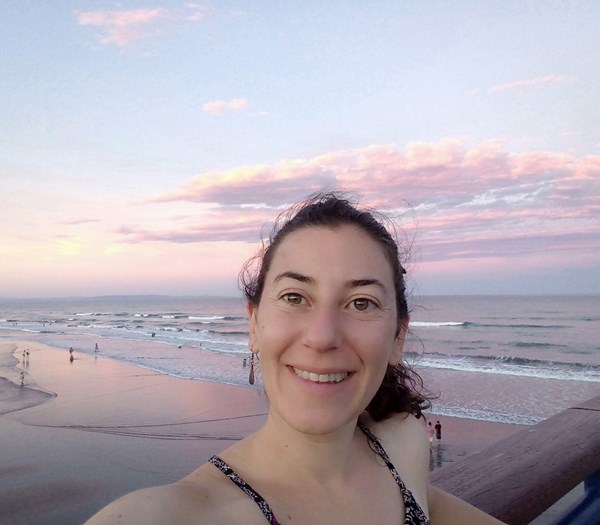
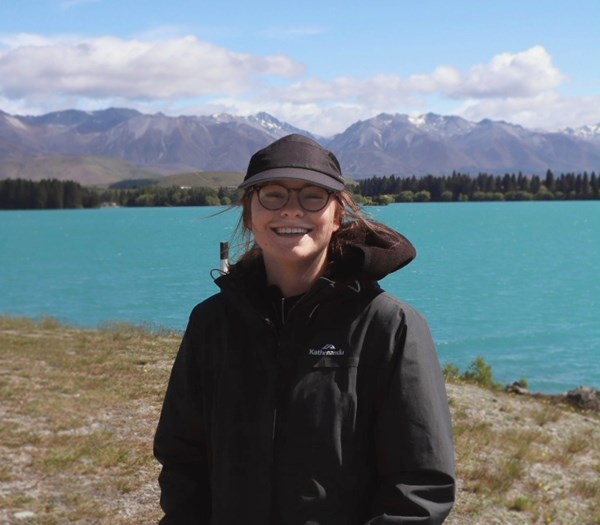
Madison Seymour
Madison’s family was originally from Whangarei but moved to Auckland before she was born. From an early age, Madison felt a strong connection with nature, even though she was raised in a city environment. Her family wasn’t ‘particularly environmentally-minded,’ yet Madison grew up with an inherent interest in, and care for, nature.
Geography had been one of her favourite subjects in school, so she chose geography for her undergraduate studies. Since then, she ‘hasn’t looked back.’ She ended up majoring in human geography, being captivated by the connection with environment, places and people. She is currently completing a master’s thesis, ‘focusing on the power of a regenerative mindset to change the way we do agriculture. This requires us to view ourselves as integrated parts of ecosystems,’ she explains.
She is solution-focused and wide-ranging in her areas of interest and engagement. She is a youth representative on Otago’s United Nations Regional Centre for Expertise (RCE), which promotes education for sustainable development, and is a member of the RCE agricultural working group. The recipient of a Prime Minister’s Scholarship for Asia, she spent two and a half months as an intern in Sichuan, China. As a research assistant through the School of Geography, she spent a month doing fieldwork in Guwahati, India, investigating wetland planning and urban development. She has also spent time in Ecuador volunteering with VESA Abroad.
Madison recognises the importance of a multi-disciplinary approach to working on solutions for climate change impacts and appreciated the diverse backgrounds and experience of her fellow Winds of Change participants. She loved the opportunity to find out more about Chile, a place she had not engaged with prior to Winds of Change. Working with her group on resilience in agriculture was a great experience that focused on some of the incredible work being done in both Chile and New Zealand, maintaining a focus on solutions while sharing stories of hope and inspiration. This positive message is very important to Madison who notes that the single biggest challenge we face collectively is one of mindset.
Her best friend Nadine remains an inspiration to Madison. ‘She is one of those people who will absolutely take their own path through life and is constantly inspiring me to do the same. She encourages me to push the boundaries of what I think I can do or achieve,’ she says. In the short-term, that dedication and drive is targeted towards finishing her master’s thesis.
My work and interests across all the environmental issues I engage with are embedded in the interconnectedness of such disciplines and the necessity of a holistic, system-based view of society and the environment.
After that, a career that is within the social change space is where Madison sees herself heading, although she is careful to remain ‘open to unexpected turns and adventures.’ What is crucial is that whatever job she takes, it will be making a purposeful contribution to our world, as this is what makes her happy. If that role involves ‘travel and integration with other cultures around the world, even better!’ she says.
Paula Ruiz
Paula was born and raised in Colombia, where her family remain. Her undergraduate degree was in biological engineering but, as well as science, Paula has a deep concern for people. It is important to her that she does something that helps both the environment and people. ‘The world could pass through all these issues and then recover, but the people don’t,’ she says.
Paula is currently living in Concepción, which she loves because it is only ten minutes’ walk to the ocean, it’s sunny, friendly, and everything — including the Universidad Católica de la Santísima Concepción, where she is completing a Master of Marine Ecology — is easily accessible.
Gender inequality in science motivated Paula to volunteer in Brazil after completing her undergraduate degree. There, she worked with students on sustainability and climate change issues, teaching children and adolescents in public schools. Her approach was to help them understand the problems through doing something, rather than just talking. Students found themselves cultivating vegetables within the school grounds, making filters for drinkable water, and learning through other hands-on activities.
Empowering girls as scientists of the future: We, as women, can change the world and help other people understand what is going on with climate change and the other issues — pollution, contamination, loss of biodiversity.
With her vision of empowering girls in science, it comes as no surprise that Paula’s mum, a civil engineer, is Paula’s hero. ‘She is the best woman I ever knew in my life. She taught me all the time to be an example, to my siblings and other girls around the world… She’s a dreamer, same as me. I love her so much.’
Winds of Change has provided an opportunity for Paula to understand what is happening in New Zealand and how scientists in New Zealand approach solution-making. She has enjoyed meeting other participants on the programme from different fields. Since she was 15, Paula wanted to be a marine biologist but, growing up far from the coast, it was her dream one day to come to Australia or New Zealand to research marine biology.
Paula’s master’s degree has included research on some of the most pristine fjords in Patagonia to gain a better understanding of how climate change is affecting seemingly undisturbed areas. The loss of biodiversity around the world and stemming the tide that is negatively ‘affecting all fauna and species globally,’ is something that she is driven by.
When asked about the future, she says, ‘this is the beginning.’ She wants to keep going, to undertake a PhD, and to continue to research the loss of biodiversity around the world.
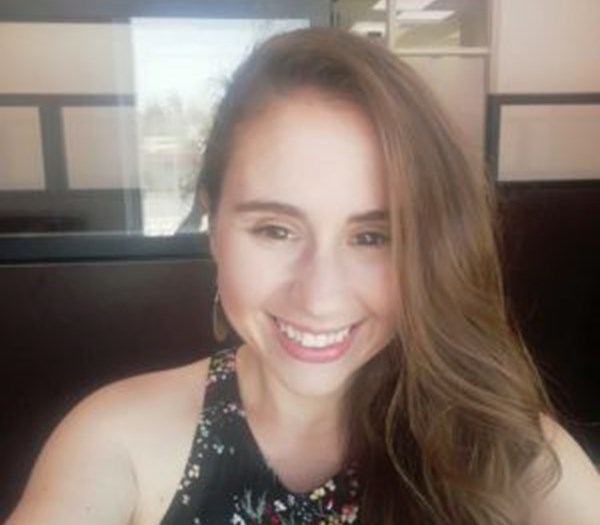
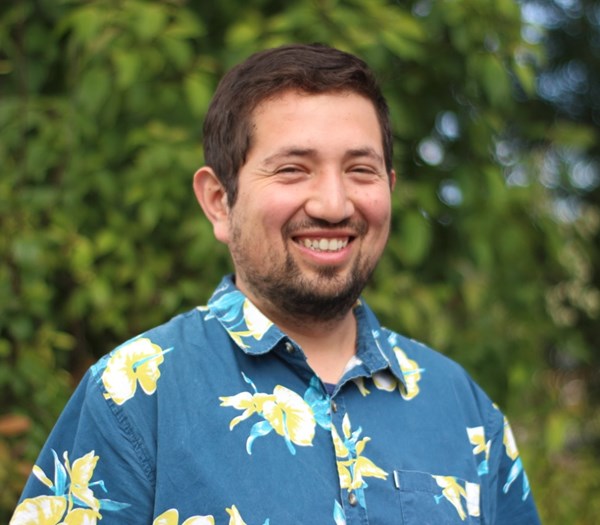
Daniel Zamorano
Daniel was born and grew up in a home full of people, with two siblings, mother, father, grandmother, grandfather and aunt, in a forgotten town of Santiago. Being involved in the scout movement from childhood, and spending time in the forest and nature, made him consciously aware of nature and the relationship between nature and people.
When considering options during his last year in high school, his ecological interest inspired Daniel to pursue study and a career as an environmental biologist. During those years, his interest in the natural environment developed within an ecological framework, with Daniel participating in many laboratories as a volunteer for different research projects.
It wasn’t until much later that his ‘classic scientific background was added to by exploring the ways in which economic, political and environmental problems are linked with inequality and capitalism.’ His interest in sustainability and scientific education was triggered by student protests and a political crisis in Chile that showed that the social structure was destroying ecosystems just to increase profits.
After three years developing his thesis project and completing all the necessary administration for scholarship and enrolment, Daniel is currently working on a PhD in Zoology at the University of Otago. At Otago, he has been able to develop his career in the freshwater ecosystem and its relationship with disturbance process, a topic that his advisor, Professor Christoph Matthaei, is a specialist in. He found the Department of Zoology to be very supportive, but it was a long process — adapting to idiom, new administration requests, and living in a completely new country.
For Daniel, participating in Winds of Change has brought the opportunity to ‘meet interesting new people that under normal circumstances I would never meet, many of them current friends and supportive neighbours.’ The field trip to Doubtful Sound is an experience that will remain with him forever. ‘The best moment was the smell of coffee and sea spray, on the deck of a ship crossing the fjord, chatting with awesome people,’ he says.
For the future, Daniel remains open to changing his line of field work. He is still drawn to ecology but finds plenty of interesting possibilities within that broad area. What he is clear about is that he does not want to work alone. He would like to have the space to learn and to be a part of something bigger, part of an organisation or institution that will have a real impact in the world.
Andrea Villavicencio
Andrea credits being born in Valdivia, with its rich nature and rain forests, for her love of the natural environment. It wasn’t until she started her university studies that she connected this love of nature with active engagement with the issues of climate change.
Originally studying industrial engineering at the Universidad Adolfo Ibáñez (UAI), she changed her focus to energy and the environment, being more interested in science than business and economy. When she exclaims, ‘I love science!’ you know that she really does. It is in her voice, warm and enthusiastic, as she says how much she enjoys her studies and the opportunities available to her.
The more Andrea learned about the impacts of climate change, the more she wanted to do something tangible, to make a positive impact. Realising that the university had a long way to go in raising awareness and developing strategies to address climate change impacts, Andrea founded BioHuella UAI. This group is dedicated to making the university more sustainable. To begin with, the group developed projects in the key areas of waste management, energy efficiency and environmental education. Their approach is a collaborative one. They work with students and staff to gain insight into their views on recycling and sustainability, and then identify gaps or potential directions for making meaningful change together.
At BioHuella UAI we want to change the world, to contribute something in terms of sustainability and the environment, to make the entire university community aware of what is happening on the planet.
When she saw an email about Winds of Change, Andrea was excited, although she never expected to be accepted. She has enjoyed the programme and the dual learning across both countries, identifying links and potentials between Chile and New Zealand.
When Andrea lives at home, she lives with her extended family, including nieces and nephews. Her family, and particularly her mother, have had a huge influence on her. She describes her mother as being ‘energetic, always doing something,’ which seems like a reflection of Andrea herself, who is effervescent and brings a sense of continual movement to the conversation. Most of her spare time is spent on BioHuella and the organisations she is engaged with, where she loves to design posters and educational materials, and develop engaging interventions. This work she considers to be her hobby.
Other influences on Andrea have included teachers, and her friend Renato Rojas whom she credits as starting her life in climate change. Renato has gone on to create the Sustainability Office at UAI and continues to be a guide on the journey.
In the future, Andrea would like to travel to do a master’s degree somewhere else in the world. Having never lived by herself and having lived most of her life in Viña del Mar, she would love to travel to Europe to study solutions for climate change, energy, and waste management, that could be applied within Chile.
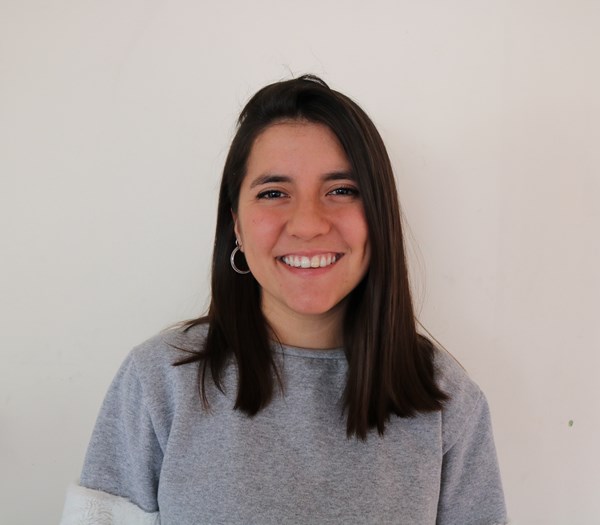
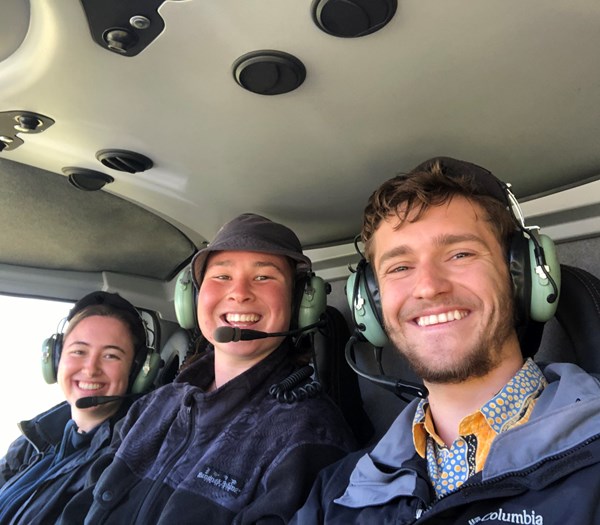
Fox Meyer
Fox is no stranger to moving around. Born in Berkeley, USA, where his father was completing study in marine biology, the family moved around continually from then on, both within the US and internationally.
An undergraduate dual enrolment programme commencing with two years at George Washington University allowed Fox to focus on geology, which hadn’t been offered at his high school. From childhood, Fox has loved Sci Fi, which is what hooked him on geology.
From his father he inherited an interconnected system-based view of the environment, which led him to study terrestrial geology. He had a brief brush with astrogeology but prefers to be out in the field, working with his hands.
The son of ‘hippies’, both scientists, an interest in the environment has been a part of Fox’s life experience. Other influences include poet Mary Oliver and astronomer and planetary scientist Carl Sagan. Reading Oliver was a major turning point for Fox because ‘she made me realise that being completely a scientist or completely an artist is a waste of either talent. You get more out of both when you marry them,’ he says.
Fox transferred from the US to complete his undergraduate degree in New Zealand. New Zealand appealed because it was small, far away and, at least by reputation, relatively untouched. It also had the geological appeal of mountains and fault lines, two things his flat Ohio campus was sorely lacking. The decision to study at the University of Otago was made after googling ice skating rinks in New Zealand and discovering that Dunedin was home to one of the best!
Fox describes the opportunity to participate in Winds of Change as, ‘fantastic, a privilege,’ and he is excited about the future of the network. The work that Fox has been moving towards is pairing journalism with science, ‘giving people a platform to communicate their science,’ and the means to communicate science in a way that is accessible to different audiences. He has been working in this way with the Sustainable Ocean Alliance and this will remain a focus for the future, including his ongoing work with the Winds of Change network.
I’ve always been really curious about how things connect— these living pieces and these non-living pieces—how do they fit in with each other and how did they get to that stage? More importantly, how are we disrupting the way things are supposed to work?
In 2019, Fox was an Education New Zealand Think New Grant winner for a project based around the Otago Harbour. In 2020, he was the recipient of one of Otago’s Young Alumni Awards for his demonstrated ‘commitment to ensuring the future is a better place for us all.’ The year ahead will see Fox completing his honours. Beyond that, he wishes to contribute to the land and peoples of New Zealand however possible.
Rodrigo Calderon
Rodrigo was born in Iquique, in the far north of Chile, but moved to Santiago with his family when he was five years old. He describes his family as a ‘humble’ family. They moved to Santiago for his father’s work in construction, and to find better opportunities for the family.
He attended public school in Santiago and was fortunate to have good teachers there. Rodrigo enjoyed school and especially loved the library, where he spent much of his time. His interest in environmental sustainability came to the forefront in the first year of his undergraduate study in geography.
At that time, he realised ‘how the environment is really, really important and how it can determine so much.’ This was around 2006 to 2007, when people had become very concerned about climate change and, because there were no specific strategies to address climate change, there was a lot of concern and discussion about ‘how to adapt, especially from a geographical point of view.’
Rodrigo is currently working on a PhD in disaster risk and resilience through the University of Canterbury. This builds on his previous work with the National Volcano-monitoring Network in Sergageomin (Chile), where he worked in volcanic risk assessment and risk assessment strategies.
Aside from the physical behaviour of volcanoes, it is the human impact, the impact on communities and how best to protect them, that is at the heart of his current research.
In 2016, while attending a conference in Chile, Rodrigo met some academics who were researching silicic eruptions. They had a great conversation and asked Rodrigo to work with them on a research project and publication. Later, they invited him to Canterbury for two weeks and, eventually, from the initial project and subsequent meetings, a PhD opportunity for Rodrigo developed.
He returned to New Zealand in October 2019 to start his research.
About leaving Santiago on October 18th, the day the social unrest in Chile started, he says, ‘I drove with my parents to the airport. Usually that takes 20 minutes. It took two and a half hours, avoiding demonstrators, avoiding barricades, avoiding the police. It was totally crazy, and it was really emotional for me to leave the country at that moment… it was really intense. When I came here, I was really focused on what was going on in Chile.’
He has loved Winds of Change, and especially working with his group on the topic of wildfires. He is enthusiastic about the process of working together to come up with the topic, refining that topic, and deciding on the best way to communicate their research.
In terms of influences, the Puyehue-Cordón Caulle eruption in Chile in 2011 was significant for Rodrigo. Before that, he had considered extreme events to be immediate, with immediate effects. But in this case, the event was ongoing, disrupting people’s lives in different ways, and for longer. That, and the eight years 35 he spent working with the National Volcano-monitoring Network have shaped the direction he has taken with study and career.
He is drawn to working with developing countries ‘that may not have the opportunity to develop their own networks or scientific collaborations,' and so his professional dream is to work in the area of disaster risk reduction with the United Nations. Although he is in no hurry to leave New Zealand, he would like to live and work in Geneva in the future.
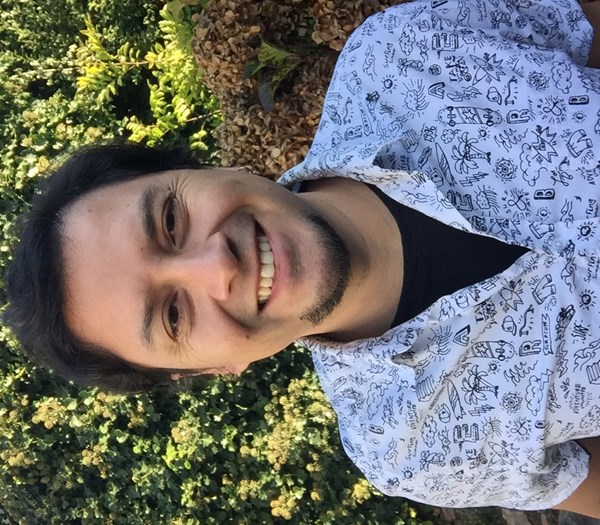
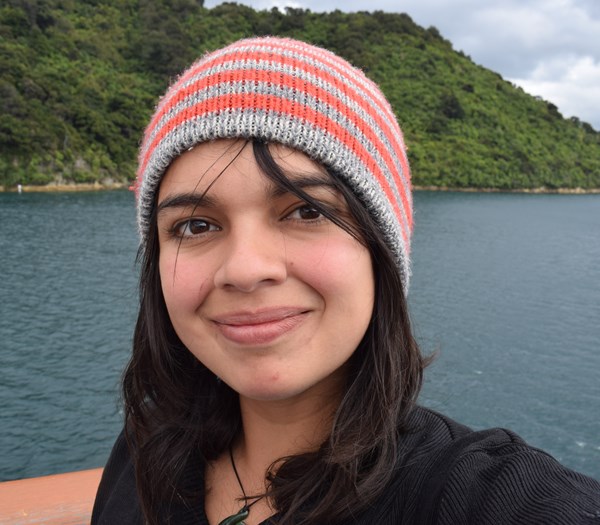
Javiera Benavente
Javiera grew up in the small city of Curicó, south of Santiago, where her father is a doctor and her mother a nurse. Because the choices of university in Curicó were limited, once she completed her schooling, Javiera attended the Universidad de Concepción, where she studied Biological Sciences.
Javiera can’t remember a time when she wasn’t interested in ecology and biology. She is an animal lover and an avid documentary watcher. Growing up outside the city meant that there were always dogs and cats at the family home, with the cats keeping rats at bay. Even when she was living in a tiny apartment in Concepción, she had gerbils, which she used to train. They are ‘really cool and pretty smart,’ she says.
Javiera remembers becoming interested in deforestation and other issues, prior to climate change becoming, 'a thing in Chile, that everyone was worried about.’ By the time she was considering her postgraduate direction, she knew she wanted to align her research with climate change issues. Although her family doesn’t necessarily share her particular ecological focus, her parents have always been supportive and encouraged Javiera’s interest in science.
After undergraduate studies, Javiera completed a Master of Biological Sciences at the Universidad de Chile. A brief internship in Canada made her realise that she wanted to complete her PhD somewhere outside of Chile. Canada was no longer an option, so she expanded her search and came across an opportunity to work with Dr Kevin Simon from the University of Auckland. Her application was successful, and she arrived in Auckland in August 2017. Her research explores the effects of increasing temperatures on fish physiology and the ecological impacts of these changes in freshwater ecosystems.
Despite the challenges of being geographically distant, Javiera enjoyed working with her Winds of Change group on their wetlands project. As someone who loves the outdoors, hiking, and swimming, she found the field trip to be ‘an amazing experience’ and a good opportunity to see some other areas of New Zealand. In the north, she loves Great Barrier Island, which she has only visited once but would like to return to. In Chile, she loves Patagonia, near Villa O’Higgins, ‘where there’s just one little town and then nothing, and it feels super wild.’
Water deficit will have a major impact on terrestrial and freshwater ecosystems. My research experience has allowed me to understand environmental problems and think of ways to tackle things such as biodiversity loss and loss of ecosystem functioning in freshwater ecosystems.
In the future, Javiera would like to continue researching how species adapt to changes. Her preference would be to work with a research institute or organisation, and she would like to be based in either Europe or Japan. Once her PhD is completed, Javiera hopes to be able to visit her family in Chile, whom she misses very much. ‘I really like what I’m doing, but it’s hard being away from everything,’ she says.
Pía Weber
Pía was born in Valparaíso, Chile, but lived in many different places because of her father’s navy career. She has lived in Punta Arenas, in the south, which was ‘an amazing experience,’ especially in summer when night comes for only three hours. She has also lived in Santiago and spent two and a half years in Melbourne, Australia, where she completed a Master of Law.
Pía has recently moved to Futaleufú, Patagonia, making the most of the ability to work remotely that COVID-19 has created. As well as working for the government full-time in the Service of Environmental Impact Assessment, she has established a non-profit organisation, the Ngenko Foundation — alluding to the spirit protector of water for the Mapuche people — which focuses on environmental education and awareness of access to, and protection of, water.
She has always felt connected to nature, having enjoyed camping with her family on a regular basis from when she was six months old, and loving the outdoors, sports, and trekking. The environment wasn’t her initial professional focus when studying law. She originally ‘wanted to put people in jail,’ she says ruefully, 'not an approach I can relate to at all now. So negative!’
She chose to do her thesis on rules to impose environmental sanctions because she was interested in reviewing the outcomes of the 2010 Chilean reforms that had established the Ministry of the Environment, the Superintendency, and the Service of Environmental Impact Assessment. That was when she became passionate about environmental law.
We definitely need to change the way we relate to nature. We’re one more element of the environment. We’re not superior to anything else or any other species. I think that’s the main problem with how we’ve been approaching nature.
While Pía has enjoyed Winds of Change, as with the other Chilean based participants, maintaining a solid sense of connection was made difficult by being in another country, a different time zone, and engaging solely via online communication. Her group’s project, on wetland restoration, was a perfect synergy for the two countries, with Chile having recently passed a new Urban Wetland Law and much work being done to promote wetland restoration in New Zealand.
For the future, Pía would like to move towards working fulltime for the Ngenko Foundation. Ensuring that community is actively involved in legislation that impacts on their environment is something Pía sees as vital, rather than a topdown imposition of law. The projects she is currently working on with Ngenko focus on engaging community at different levels, education, and enhancing public participation mechanisms.
Pía is also committed to raising awareness of the need to change the way we live and how we protect the environment. Education plays a key role in this. As she says, ‘I think the younger generation that is more aware of the environment, of the need to live a healthy life, to be more connected with nature… that’s going to be the salvation, the only way we can live in harmony for many, many years as humans on this earth.’
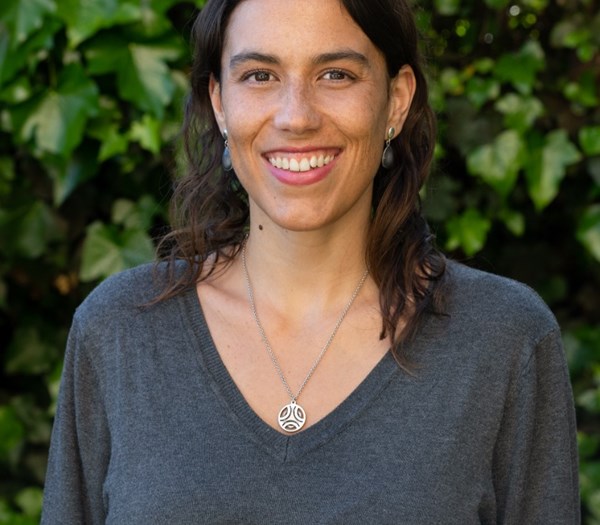
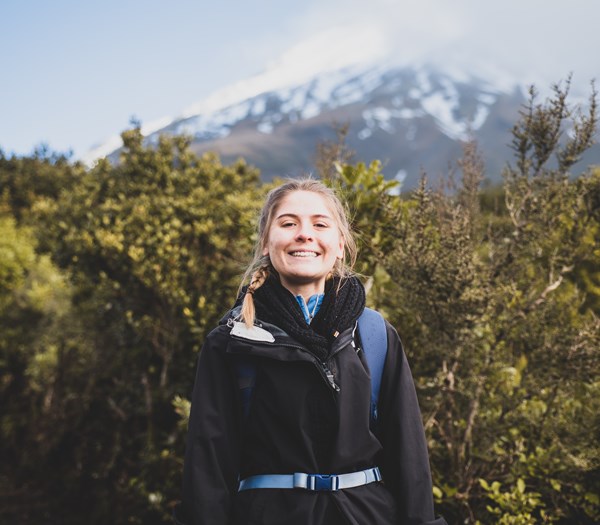
Rachel Keen
Rachel was born in Pennsylvania, USA, and moved to New Zealand with her mother, father, and older brother when she was nine. The family settled in New Plymouth, in the Taranaki region, which is where Rachel completed her schooling before moving to Wellington for university.
A love of animals and of the environment has been with Rachel always. As a child, she spent many years making presentations to her parents to persuade them to get a dog, although she wasn’t successful! During her school years she volunteered for the SPCA and was involved in an environmental group that did regular beach clean-ups and other activities. Being a member of a church that was involved in community and having a church leader who was ‘very missional’ also influenced Rachel.
An International Relations and Development Studies major, Rachel’s engagement with the environment and sustainability was primarily through the groups she became involved with, rather than her academic studies.
A good friend was also influential in her developing interest in conscious consumerism. The friend, who has always been a staunch advocate, has been a role model for Rachel who, as a younger person, ‘didn’t always have the confidence to stand up for big ideas such as environmental concerns or animal rights,’ she says. During her undergraduate years, development studies had been her main interest but left her ‘uninspired and not hopeful.’ It wasn’t until she did a paper on international politics of the environment in her final undergraduate year that she felt a synthesis of her interests.
For Rachel, Winds of Change has been significant. It has ‘really changed the direction of how I saw my life going,’ she says. Talking to other Winds of Change participants about geography brought the realisation that it was almost as though her ‘life had been about geography in terms of international background,’ but that she’d somehow missed that connection. This epiphany means a radical change for the future. Having never studied geography, not even in high school, she is now exploring the possibility of doing a postgraduate qualification in geography.
I can see now how geography and environmental degradation play a large part in development and how bettering the environment can improve people’s situation.
Rachel loves travel, and her family frequently travelled throughout the Asia-Pacific region after settling in New Zealand. A high school exchange to Chile instilled a love of Spanish and Latin America, and Rachel would like to work there in the future. In the interim, Japan is the next port of call, where she will teach English for a couple of years before embarking on postgraduate studies.